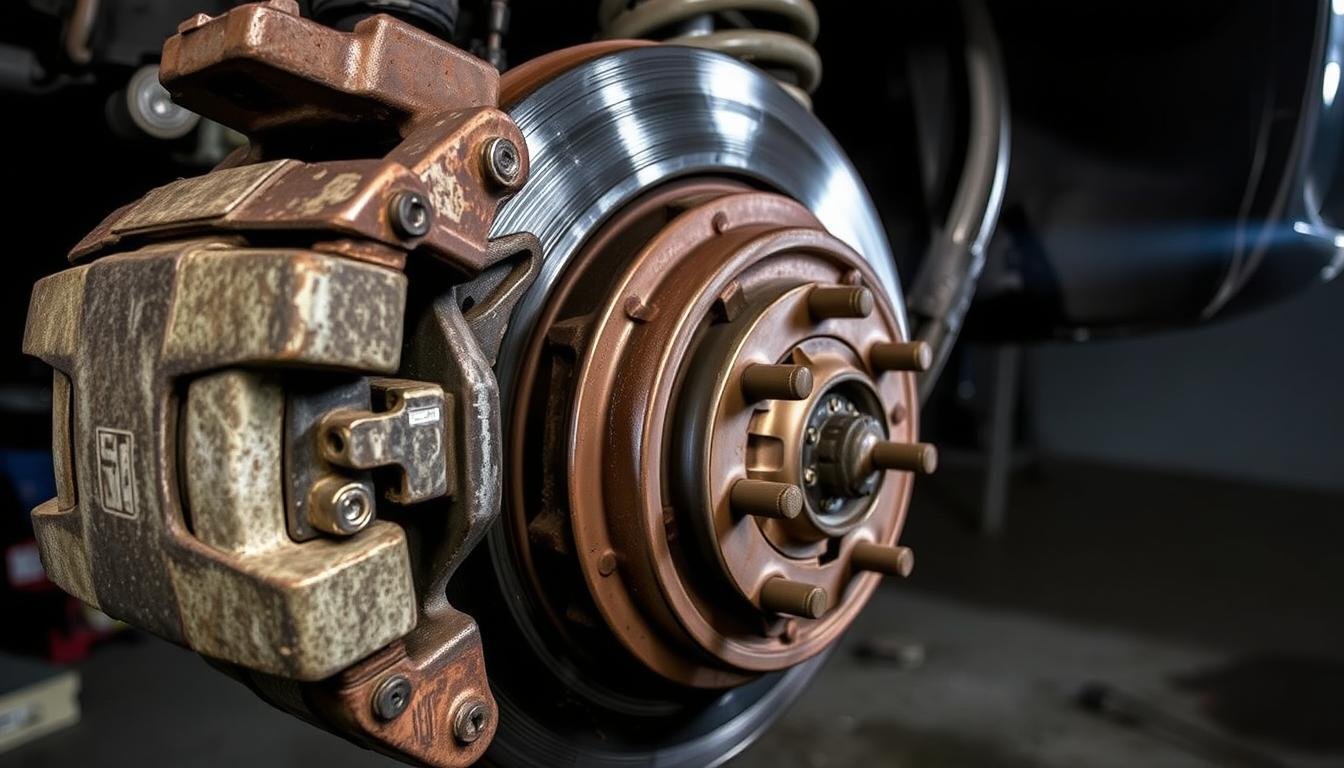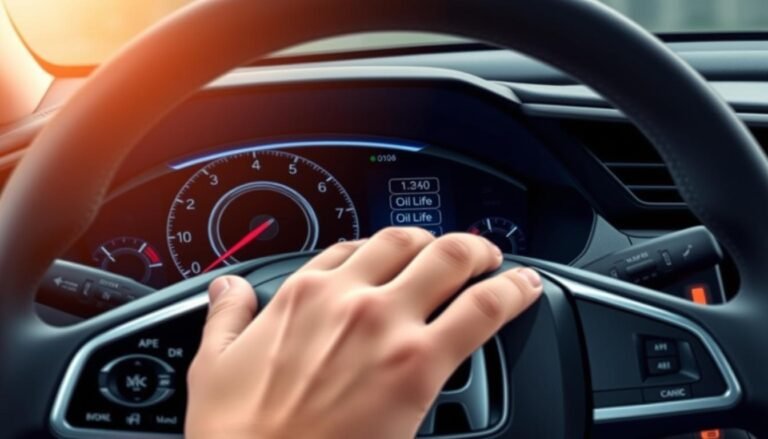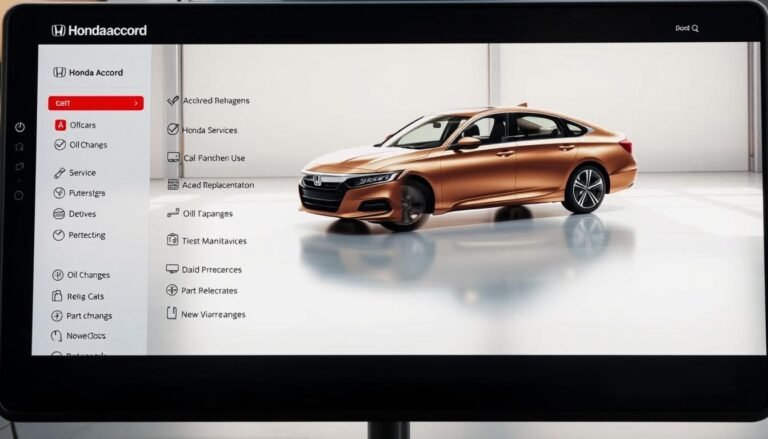Honda Accord Brake System Problem Fixes
Having trouble with your Honda Accord’s brakes? You’re not the only one. Many owners face brake problems over time.
This guide will show you signs of brake failure, common issues, and how to fix them. It’s all about staying safe and saving money.
It’s crucial to catch brake problems early. Watch for dashboard warnings, strange sounds, or a different feel when you brake.
Spotting these signs early lets you handle the issue quickly. This article gives you the tools to diagnose and fix your Honda’s brakes, keeping your ride dependable.
This guide provides simple steps and helpful tips to fix brake issues on your own. Ready to make sure your Honda Accord is safe and runs well? Let’s get started.
What is The Honda Accord Brake System?
The Honda Accord’s brake system is key to keeping you safe on the road. It has important parts like brake pads, rotors, calipers, and a master cylinder.
Each part works together to stop your car reliably. Knowing how these parts work together helps you keep the brakes working well.
Brake pads rub against the rotors, while calipers press the pads onto the rotors. The master cylinder controls the brake fluid, making sure the brakes engage smoothly.
Learning these parts means you can spot problems early. Checking your Honda Accord’s brakes often makes sure your car stays safe to drive.
Watching for wear and tear lets you catch issues early. This can prevent expensive repairs and keep you safe on the road.
Common Brake Problems Affecting Honda Accord
Knowing about common brake problems can make your drives in a Honda Accord safer. You can spot warning signs of brake issues early on.
This information will guide you through important signs and common brake problems.
Signs of Brake Failure in Honda Accord
Spotting brake failure signs early can prevent expensive repairs and keep you safer. Watch for these warnings:
- Squeaking or grinding noises when braking.
- Vibration or pulsation from the brake pedal.
- Illumination of warning lights on the dashboard.
- Increased stopping distance.
- Brake fluid leaks beneath the vehicle.
Typical Honda Brake Issues
Brake problems in Honda Accords stem from wear and tear or mechanical issues. Some common issues include:
| Issue | Description | Possible Causes |
|---|---|---|
| Worn Brake Pads | Reduced braking efficiency and increased stopping distance. | Normal wear and tear from usage. |
| Low Brake Fluid | Brake warning light activation; risk of brake failure. | Fluid leaks or evaporation. |
| Failing Master Cylinder | Inconsistent braking; spongy brake pedal feel. | Internal leaks or wear over time. |
Troubleshooting Honda Accord Brake System Problems
If you’re having brake problems with your Honda Accord, it’s key to tackle them step by step. First up, check the brake system basics.
Make sure the brake fluid is at the right level, look out for any leaks, and listen for odd sounds when you brake.
These early checks are crucial to spot what’s wrong before getting into more detailed tests.
Initial Steps To Diagnose Brake Issues
To figure out what’s wrong with your brakes, start with these actions:
- Check the brake fluid level; a low level may indicate a leak.
- Inspect the brake pads and rotors for wear and damage.
- Listen for grinding or squeaking noises while braking.
- Look for warning lights on the dashboard, particularly related to the brake system.
Common Error Messages and What They Mean?
Knowing what common brake system error messages mean is key to fixing your Honda Accord.
For example, messages like “Brake System Problem” or “ABS Warning” point to specific issues.
Below, see a table that explains some of these messages and what they suggest:
| Error Message | Meaning |
|---|---|
| Brake System Problem | Indicates a malfunction in the brake system; further inspection needed. |
| ABS Warning | Suggests an issue with the Anti-lock Braking System, impacting brake effectiveness. |
| Low Brake Fluid | Signals low brake fluid levels possibly due to a leak or worn brake pads. |
Honda Accord Brake System Problem: Battery Connection Issues
The brake system in your Honda Accord depends a lot on electrical parts, and a bad battery can cause big problems.
It’s key to know how a failing battery can mess with the brake system to keep your car running smoothly and safely.
If you spot signs of a bad battery early, you can fix issues before they get worse.
Signs Your Battery May Be Failing
- Dimming dashboard lights indicate insufficient power.
- Difficulty starting the vehicle suggests weak battery connections.
- Frequent need to jump-start the car may point to a bad battery.
- Corrosion on battery terminals can disrupt connection.
- Unexpected electrical issues, like erratic behavior of warning lights.
How A Bad Battery Affects Brake System Performance
A weak battery can mess up the brake system in your Honda Accord. Not enough power can make the brakes work weirdly, like responding slowly or not at all to your touch.
This can also mess up electronic brake help features. Battery problems might make the brake system give off false alarms, making driving tricky.
Getting your battery checked regularly helps avoid these problems and keeps your brakes reliable.
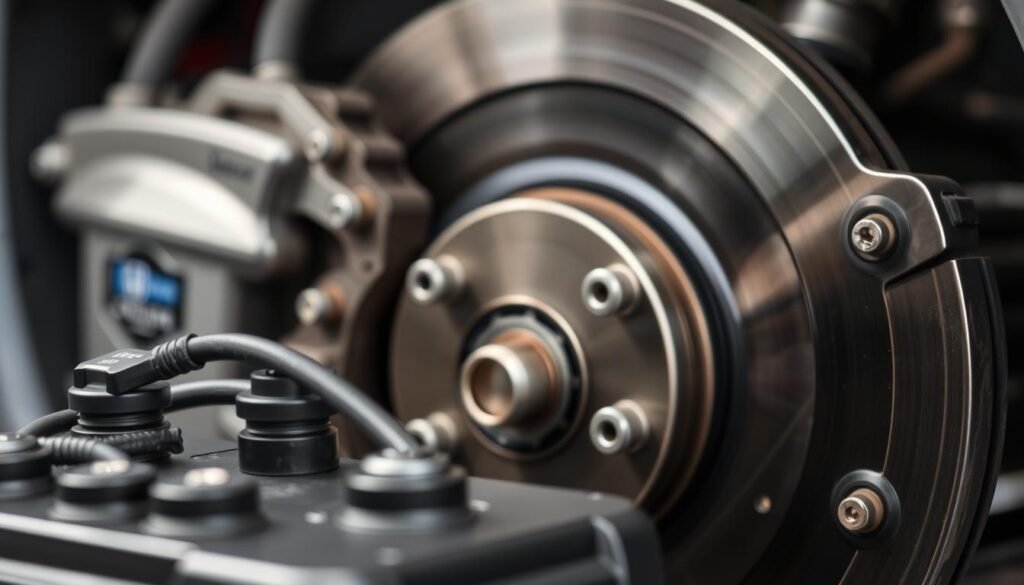
Interpreting The Honda Accord ABS Warning Light
It’s very important to know what the Honda Accord ABS warning light means. This light tells you there might be a problem with the brakes.
The ABS prevents the wheels from locking up when you brake hard, helping you stay safe. Seeing the ABS light on could mean there’s a brake issue.
Problems could be with the ABS sensor, wiring, or the hydraulic control unit. Fixing these problems quickly keeps you safe while driving.
If the ABS warning light is on, check your brakes soon. Ignoring this light can make your car less safe by affecting how well your tires grip the road and how quickly you can stop.
| Warning Light Status | Possible Cause | Recommended Action |
|---|---|---|
| ABS Light On | ABS sensor malfunction | Check sensor connections, consider replacement |
| ABS Light Flashing | Low brake fluid or hydraulic issue | Inspect brake fluid levels, check for leaks |
| ABS and Brake Light On | Serious brake system failure | Seek professional inspection immediately |
| No ABS Light | System functioning normally | Regular maintenance recommended |
Identifying Common Electrical Issues Leading To Brake Problems
Knowing how the electrical systems in your Honda Accord work is key to keeping brakes working right.
Electrical issues can cause trouble, like bad wiring, loose connections, or issues with the electronic control unit.
These can make brake warning lights come on or even cause total system failures. Spotting these problems early helps avoid danger and keeps you safe on the road.
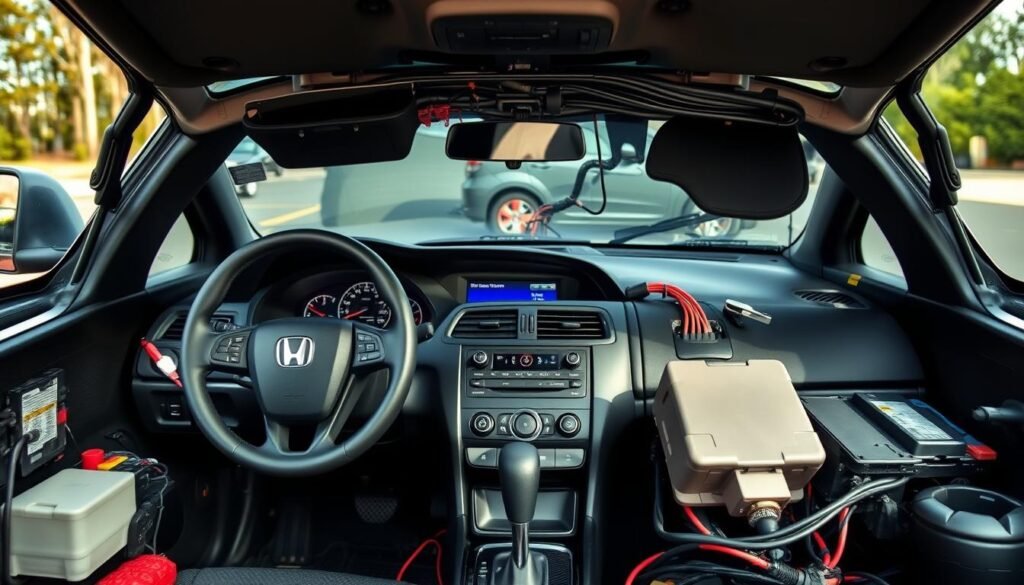
The Role of Electrical Systems in Brake Functionality
The brake system depends a lot on electrical parts to work properly. Here’s a look at some key electrical parts that help brakes do their job:
- Electronic Control Unit (ECU)
- Brake Light Switch
- ABS Module
- Wiring Harness
Each part has a role in making sure your brakes work smoothly. For instance, the ECU gets signals from sensors to tweak the brakes as needed.
A malfunction in any of these can lead to big brake problems. Regular checks of these parts can catch electrical issues before they become bigger problems.
How To Fix Brake Problems in Honda Accord?
Fixing brake problems in your Honda Accord is crucial for safety and a better driving experience. To tackle these issues, start by following specific troubleshooting steps.
These steps focus on examining and fixing the problem. Correctly identifying what’s wrong is necessary to fix it right.
Step-by-Step Guide To Troubleshooting Brake Issues
Start by thoroughly checking your car. You should:
- Look for wear on brake pads and rotors.
- Check the brake fluid level at the reservoir mark.
- Listen for any strange sounds when you brake, signaling issues.
- Inspect brake lines for leaks or damage.
- Check the ABS warning light on your dashboard.
Based on what you find, you may need to replace parts. Always use manufacturer guidelines for your Honda Accord to keep it in good shape.
Tools Needed For Repairing Brake System
It’s important to have the right tools for fixing brakes. Make sure you have these tools ready for a smooth repair process:
| Tool | Purpose |
|---|---|
| Wrenches | Loosening and tightening bolts and nuts on brake components. |
| Screwdrivers | Removing and installing brake parts. |
| Brake fluid tester | Checking fluid condition and moisture content. |
| Jack and jack stands | Raising the vehicle for safe access to the brakes. |
| Torque wrench | Ensuring bolts are tightened to specifications. |
Honda Brake Service: Routine Maintenance Tips
To keep your Honda Accord safe and performing well, looking after its brake system is key. Doing routine checks helps spot problems early.
This also makes your car’s parts last longer. Checking your brakes regularly should be a major part of taking care of your vehicle.
Importance of Regular Brake System Inspections
Checking your brakes often is critical for safety. It helps you notice wear and tear before it turns into big issues. Here are the benefits:
- Enhanced stopping power, reducing risks during sudden braking.
- Increased safety for you and your passengers.
- Longer lifespan for brake components, lowering overall repair costs.
Recommended Maintenance Schedule For Honda Accord
A maintenance schedule for your Honda Accord helps you check your brakes at the right times.
Here’s when you should perform key brake checks:
| Task | Frequency |
|---|---|
| Brake Fluid Check | Every 6 months |
| Inspect Brake Pads and Rotors | Every 12,000 miles |
| Brake System Inspections | Annually |
| ABS System Effectiveness Check | Every 2 years |
Having a clear maintenance plan ensures your Honda’s brakes work well, keeping you safe on the road.
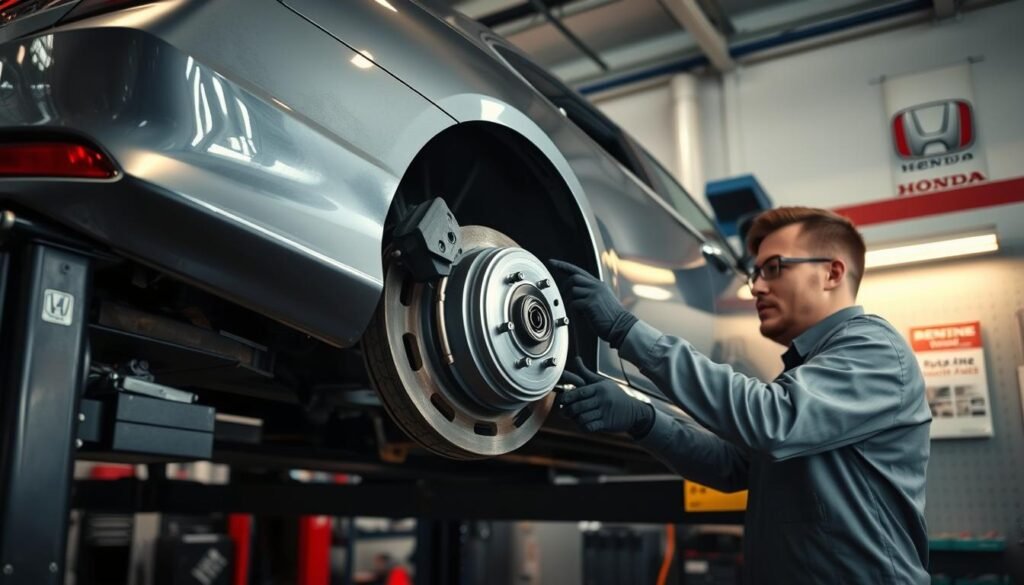
Learning Software Errors Affecting Brake Performance
Modern cars like the Honda Accord depend a lot on software for braking. Errors in software can cause big brake performance issues.
This can make driving unsafe. Problems often come from not updating the software, wrong settings, or broken sensors.
Knowing about these errors helps keep your brakes working well. To fix software errors in a Honda Accord, first, look for software updates.
Car makers update software to improve it or fix problems. These updates are at dealerships or on the car maker’s website.
Keeping your car’s software up-to-date stops brake problems from happening. Finding software issues might need special tools.
A professional scanner can spot error codes that show software or sensor problems. If braking problems keep happening, resetting the system might help get things back to normal.
So, it’s smart to keep an eye on your Honda Accord’s software. Knowing how software affects your brakes helps you take good care of your car.
This means you can avoid big brake problems and drive safely.
Taking Action When Facing Brake System Failures
Brake problems in your Honda Accord can be scary. Noticing big drops in how well your brakes work or constant error alerts means it’s time to act.
It’s critical to get expert help in these cases for your safety and to keep your car running right.
When To Seek Professional Help
Knowing when to call an expert can prevent more problems. Here are some clues you need professional help:
- Noticeable decrease in brake responsiveness.
- Unusual noises during braking.
- Repeated illumination of the brake warning light.
- Vibrations felt through the brake pedal.
- Fluid leaks near the brake components.
Knowing Your Warranty and Repair Options
When facing issues with your Honda Accord’s brakes, knowing your warranty and repair options is very important.
Honda vehicles often come with solid warranties. Here’s what you should consider:
| Warranty Type | Coverage Details | Duration |
|---|---|---|
| Basic Warranty | Coverage for defects in materials and workmanship | 3 years/36,000 miles |
| Powertrain Warranty | Covers critical components including transmission and drive systems | 5 years/60,000 miles |
| Corrosion Warranty | Protection against rust and corrosion damage | 5 years/unlimited miles |
Learning about your Honda Accord’s warranty can help you make smart choices on repairs.
If your brake problem is covered, repair costs could be low. This makes it easier to choose expert help for serious brake issues.
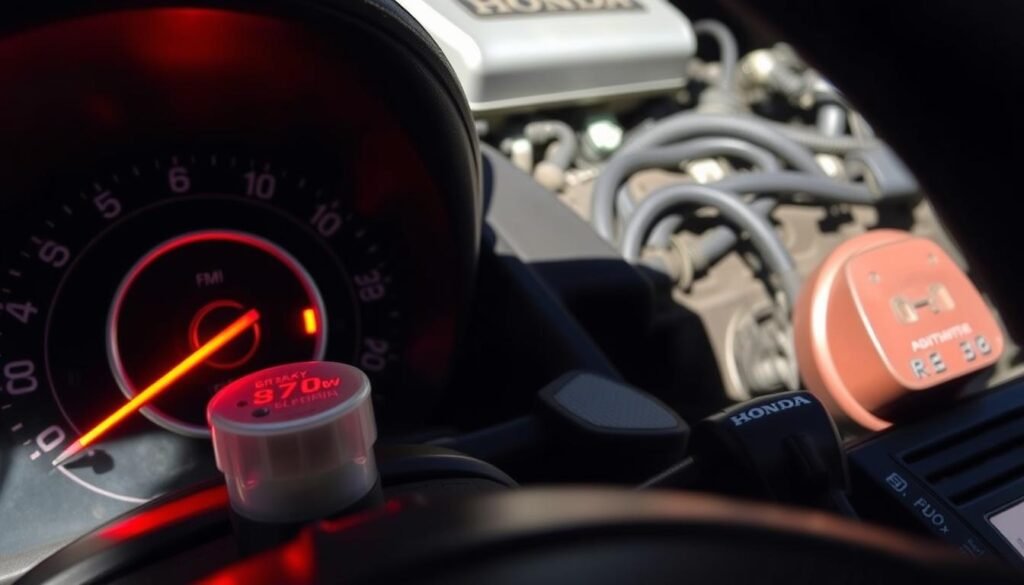
Real-Life Experiences with Honda Accord Brake Issues
Many Honda Accord owners have had trouble with their brakes. They’ve found helpful ways to fix these problems.
By sharing their stories, they help others learn how to fix their own cars.
User Testimonials and Solutions
Owner stories tell us about different fixes for brake issues. Some fixed squeaky brakes by changing the pads. Others talk about how routine checks can prevent bigger problems.
Here are some success stories:
- One user said new brake fluid made the brakes respond better.
- Another found that smoothing the rotors stopped the brakes from pulsing.
- A third person fixed their brakes by checking the ABS sensors.
Learning From Other Owners’ Mistakes
Learning from other Honda owners can save you from making the same mistakes. Many have learned the hard way by not fixing their brakes on time, which led to costlier repairs.
Here’s what we can learn from them:
| Mistake Made | Lesson Learned | Recommended Action |
|---|---|---|
| Ignoring brake warning light | Can lead to complete brake failure | Address warning lights immediately |
| Delaying brake fluid changes | Causes corrosion and reduced performance | Change fluid every two years |
| Overlooking tire condition | Impacts braking distance | Regularly inspect and replace tires as needed |
Conclusion
Getting to know the brake system problem of your Honda Accord is key for your car’s safety and how well it drives.
This article has shown you the usual brake problems, how to fix them, and why regular check-ups are a must.
Knowing this helps you deal with any brake issues your Accord might face. If you check your car’s brakes on time and follow good car care advice, you can fix brake problems fast.
This means understanding warning signs and handling electrical issues early. By taking care of your Honda Accord’s brakes, you ensure it stays dependable on the road.
Always know that learning about your car’s details improves how you take care of it. With a good plan and regular care, your Honda Accord will work well and be safe to drive.
FAQs
Q: What are common signs of brake failure in a Honda Accord?
A: Some signs include squeaking or grinding noises and shaky brake pedals. You might also see warning lights on the dashboard, like the ABS warning light.
Q: How can I troubleshoot the brake system in my Honda Accord?
A: First, check the brake fluid and listen for unusual noises. Don’t forget to look at error messages. Also, check the battery connections since electric issues can trigger false warning lights.
Q: What should I do if the ABS warning light is illuminated?
A: If the ABS light comes on, check the sensor, wiring, and hydraulic control unit. This ensures your brakes work right, especially on slippery roads.
Q: How can a failing battery affect the brake system?
A: A weak battery can cause many warning lights to turn on. This includes those for the brake system. It can also lead to odd braking behavior because of electrical faults.
Q: What routine maintenance should I perform on the brake system?
A: Make sure to check the brake fluid regularly. Also, inspect the brake pads and rotors for wear. Keep the ABS system in good working order. Stick to a maintenance schedule for the best results.
Q: How do software errors impact brake performance in a Honda Accord?
A: Software problems can mess with your brakes’ performance. This includes outdated software or bad sensors. These issues can lower your brakes’ efficiency.
Q: When should I consider seeking professional help for brake issues?
A: If your brakes are not as responsive or if warning messages keep popping up, get help from a pro. They can figure out the problem and fix it.
Q: What tools do I need to fix brake problems on my Honda Accord?
A: You’ll need wrenches, screwdrivers, a tester for brake fluid, and maybe a scanner. The scanner is for checking the brake system’s electronics.

